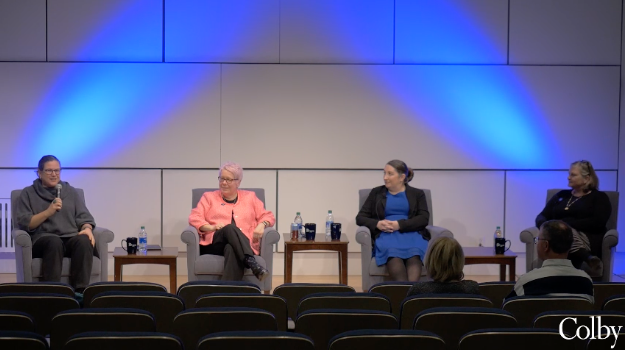Chapter Spotlight: Maine SSN Builds Relationships with State and Local Policymakers
“SSN scholars can bring real stories from real Mainers and real Maine families…The things we are trying to decide—when we can talk about it in terms of our own Mainers, our own neighbors, our own community members, it’s just really invaluable.” - Charlotte Warren, Maine House Representative
In a small state like Maine, it’s common to hear the refrain: everybody knows everybody. In that context, personal relationships with policymakers and other leaders are even more important if you want your research to inform their decisions. That’s why the Maine SSN chapter has been hard at work over the last several years to build relationships at all levels of government and with civic organizations across the state. And it’s paying off.
Over the course of the last year, the chapter received over a dozen requests from policymakers in both the state legislature and local government seeking researcher input at various stages of the policymaking process, from policy development to more tactical efforts to get objective expertise on an issue or bill. How did they get here?

The first step to closing the research-policy gap is for researchers to more fully understand the policymaking process and how they can get involved. To that effect, Maine SSN has repeatedly organized workshops on the state legislative process to give researchers a better understanding of how to navigate it. Chapter co-leader Rob Glover explained:
“We’ve run kind of the same workshop on demystifying the legislature numerous times over the past few years. Now I think our members are at a point where they have a sense of how to navigate the legislative session and the expectations of what testimony entails, and things like that, and because more of our members are engaged in the legislature, we’re seeing more incoming requests either to me as a chapter leader or to our members directly.”
These events often also feature legislators as guest speakers, allowing researchers to gain valuable insider knowledge on how the legislature works and the opportunity to start building relationships. Most recently, the chapter organized an event at Colby College called “Building Bridges: How Can Academic Research and Public Policy Inform Each Other?” that featured Maine House Representatives Jessica Fay and Charlotte Warren, as well as Julie Anne Smith, Executive Director of the Maine Farm Bureau.

At the event, Representative Warren shared her thoughts on how scholars can get involved and the value Maine SSN has provided:
“I serve on the Criminal Justice and Public Safety Committee. We do a lot of different policy work around lots of reform of the criminal justice system in general…We work a lot on restructuring drug sentencing and drug policy in the state. And I lean on both Winifred Tate and Rob Glover who do a lot of research in these areas…Not only will they come and testify, and their students will come and testify, but they’re actually doing the research...SSN scholars can bring real stories from real Mainers and real Maine families…The things we are trying to decide—when we can talk about it in terms of our own Mainers, our own neighbors, our own community members, it’s just really invaluable.”
In addition to providing members with an understanding of the state legislative process, the chapter launched an innovative legislative log several years ago that has kept chapter members up-to-date on the top local and state policy initiatives that they can get involved in. Every other week, chapter policy fellow Paul Fink digs through the legislative calendar and state political news to identify relevant opportunities and examples of SSN members working to inform policy decisions. Chapter communications fellow Alan Berry then shares these opportunities with chapter members via a chapter newsletter and other avenues.
Recently, Maine SSN decided to add instructions on how to submit testimony for bills under consideration in the legislature. To get things started, Glover provided written and oral testimony on LD 1862, An Act To Strengthen Maine’s Good Samaritan Laws Concerning Drug-related Medical Assistance, as a concrete example of what testimony from a researcher can look like. In the following weeks, chapter members Deirdre Smith, Flynn Ross, and Luisa Deprez, to name just a few, each offered testimony on state bills. Additionally, Kimberly Simmons organized a workshop on submitting written testimony for undergraduate students, resulting in numerous submissions from students on a bill regarding sexual misconduct on college campuses.
Following testimony, more SSN members are also being offered opportunities to join non-public work sessions where legislators work through amendments and speak to experts to learn more about a bill and the impacts of the amendments under consideration. This can be an invaluable opportunity to help inform changes to a bill and further get to know the policymakers.
Looking forward, the chapter hopes to continue their work with policymakers at all levels of government across the state of Maine, as well as with civic leaders and organizations serving their communities. Learn more about the Maine chapter here.
